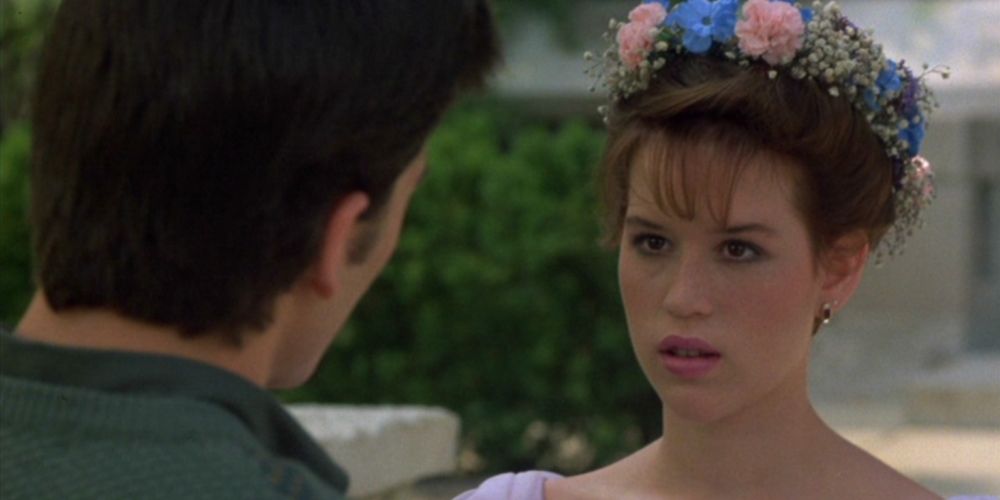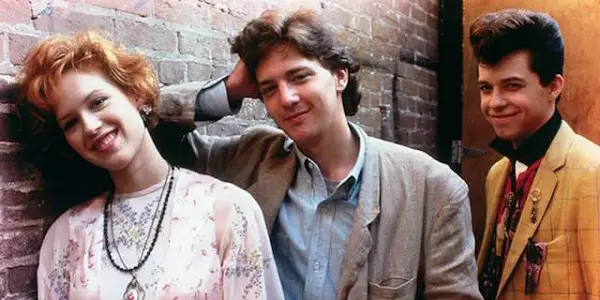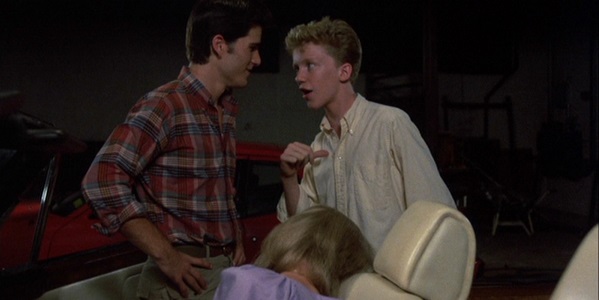John Hughes’ Women: Monsters & Angels

Siobhan is a teacher and writer living in Wales, UK.…
There’s a strange dichotomy surrounding the films of John Hughes, both written and directed. In one sense, there have been few directors that have so understood the angst of the teenage experience. Yet, conversely, Hughes’ depiction of both race and gender are entirely at odds with his apparent insight into the teen condition. In recent years, much critical comment has focused on his depiction of women in particular, with many writers noting both the roles assigned to Hughes’ women, as well as their interaction and aspirations.
What, then, makes Hughes’ women so problematic? Notably, they are not simply poor representations: there are certain elements that make their characters seem relatively progressive. It is this very complex nature that makes their characterisation so questionable. They are simultaneously developed and restricted. They are both believable, yet often acted out with wish fulfilment, thus becoming relegated to mere fantasy.
When considering Hughes’ characters, it is useful to consider them in the light of feminist theory in order to identify just why they are so troubling. Arguably for Hughes, women fall into the angel/monster trope discussed by feminist literary critics Gilbert and Gubar or even into the Madonna/Whore complex discussed by Freud. Both theories suggest that women can only fall into one of two categories; either wholly good or wholly bad. Such depictions are entirely reductive, largely because they imply that women are not complex beings who can contain elements of good and bad.
Hughes’ women often fall in to the trope of being utterly good, entirely innocent and thus perfect. In doing so, Hughes’ films are relaying to the viewer that women are to be praised for their goodness and their innocence, and should be critiqued if they do not succeed by this metric.
Class Roots and Aspirations
Many of the female characters in Hughes’ films are keenly aware of their social background. They struggle to align their lack of financial freedom with their own aspirations.
Take Andie in Pretty in Pink, whose unemployed father and house garner embarrassment. Andie is marginalised by the majority of the student body at her high school, and part of this isolation is due to her financial status. Her first meeting with Blane, her subsequent romantic interest, is fraught with social tension. Working in a record shop, she is combative in her dealings with him; aware of her service role, she mockingly inquiries how he will pay for his purchase. Later, when dating Blane, she makes it clear that she does not want him to see where she lives, and many of their meetings take on a clandestine nature.

Similarly, in Some Kind of Wonderful, much discussion surrounds the issue of class, particularly when Keith, the film’s protagonist, expresses his desire for Amanda Jones. Watts, Keith’s best friend and eventual romantic interest, immediately expresses her disdain for Amanda, linking her dislike to her choice of friends. For Watts, Amanda presents a problem because she spends time with the wealthier students and is subsequently to be hated by association. In dating Amanda, Keith decides to spend his hard-earned money that his father has allocated for Keith’s college education, on attempting to create a memorable night for her. In Keith’s eyes, Amanda can only be swayed and attracted by the allure of wealth. For Keith, this is the way in which Amanda will be won, not by care or attention, but by impressing her through numerous superficial gestures.
Keith, in watching Amanda before approaching her, notes that on a number of occasions her wealthier boyfriend treats her poorly. Yet, Keith does little to present an alternative and mimics the wealthy behaviour that he seems to believe that Amanda enjoys.

Watts, when flirting in an attempt to make Keith jealous, notes that ‘this is 1987, did you know a girl can be whatever she wants to be?’ and yet, despite her assertion, she shows little interest in anything aside from Keith.
Much like Watts and her desire for Keith, Sloane in Ferris Bueller’s Day Off seems content with Ferris’ belief that they will get married. Certainly, it is clear that Ferris cares for Sloane, but by informing Sloane that they will get married after high school, he appears to have little aspiration for her other than for her to fulfil a typical gender role.
While the teen experience is one in which relationships are often the focus, and any further thoughts beyond high school or college are unlikely to be at the forefront of thought, it is disappointing to see that Hughes declines to provide his women with little more than romantic entanglements as an aim.
Relationships with men
In recent years, Sixteen Candles in particular has found itself the subject of much criticism, largely due to the treatment of Caroline, the girlfriend of Jake. Caroline’s attitude to casual sex is clearly derided, her conventional attractiveness making her available. Her perceived availability leads to her objectification. Take the conversation between Jake and The Geek when discussing Jake’s romantic interests.
Jake: I can get a piece of ass anytime I want. Shit, I’ve got Caroline in the bedroom right now, passed out cold. I could violate her ten different ways if I wanted to.
The Geek: [almost chokes on a pretzel] What are you waiting for?
Jake: I don’t know. She’s beautiful, and she built and all that.
Given that Jake is the object of protagonist Samantha’s desire, he is a character whom the viewer is led to like and empathise with. This apparent likability is entirely at odds with Jake’s permissive view toward consent. To him, Caroline is an object to be enjoyed, regardless of her ability to provide consent. Jake, no longer interested in Caroline due to his pursuit of Samantha, allows The Geek to take Caroline home. This leads to her having sex with The Geek while intoxicated, an act that is objectively and unquestionably date rape. Worryingly, the viewer is supposed to view this moment as romantic and charming, rather than a criminal act.

While this interaction and treatment is certainly the most questionable of Hughes’ roster, the slut-shaming discourse can also be seen in The Breakfast Club. During a conversation surrounding Allison’s apparent sexual escapades, Claire’s sexual status is discussed. Bender immediately refers to Claire as a tease, in an attempt to discover whether or not she is a virgin. After being accosted by all three men, Claire feels compelled to admit that she is a virgin, a status that is seen as just as shameful as not being one.
Final Denouement
For many viewers, Hughes demonstrated a clear talent for writing about the teenage experience, yet his depiction of it is incredibly limited and not at all reflective of the broad nature of youth. Certainly, Hughes could not have portrayed an everyman experience, and to criticise him on this would be reductive. Yet, for a director who intentionally focused on writing about a very specific experience, such an experience should be universal.
Hughes’ focus is too narrow, and his depiction of women in particular is especially troubling. His women are not fully developed characters: their motivations and aspirations are simple, as are their interactions.
Do you agree? Or do you think Hughes‘ women are more complex?
Does content like this matter to you?
Become a Member and support film journalism. Unlock access to all of Film Inquiry`s great articles. Join a community of like-minded readers who are passionate about cinema - get access to our private members Network, give back to independent filmmakers, and more.
Siobhan is a teacher and writer living in Wales, UK. She holds a BA in English and an MA in Film and Television Studies. She is especially interested in depictions of female desire, transitions from youth to adulthood and performative gender. She tweets at @siobhan_denton and writes at https://theblueandthedim.wordpress.com/












